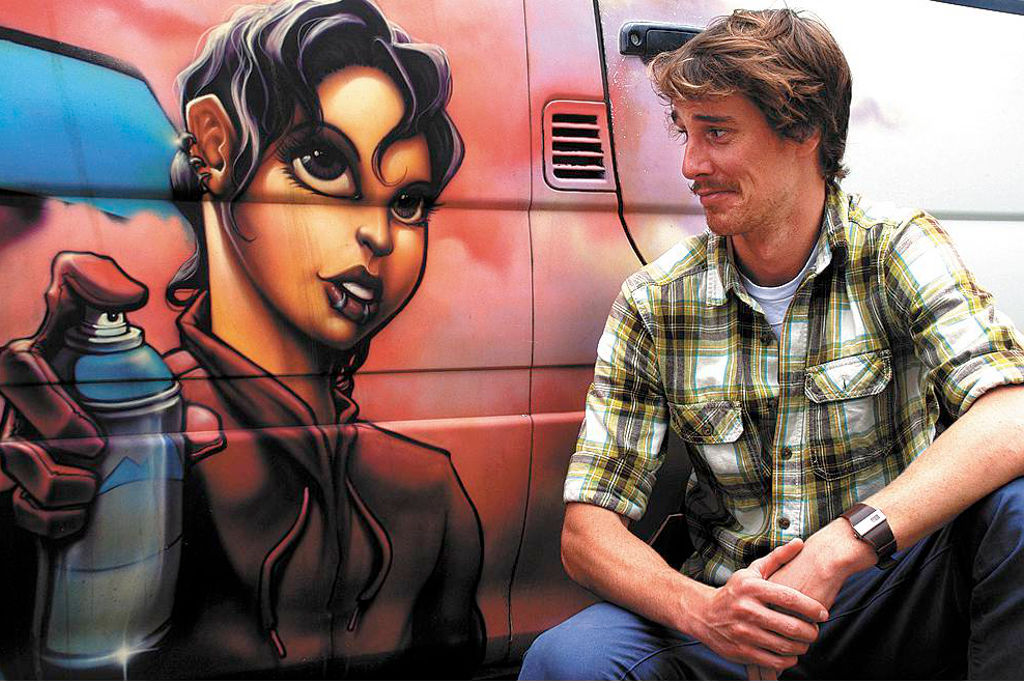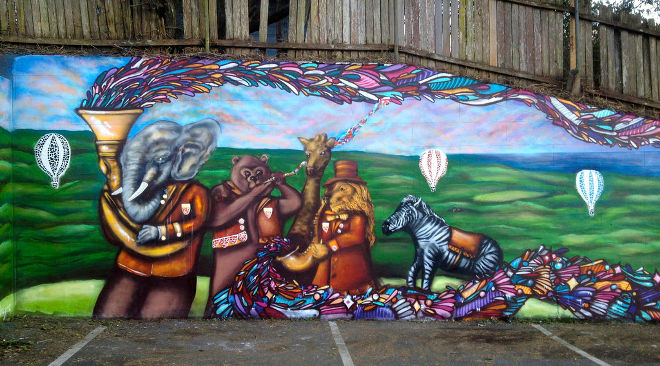Want To Start A Business That Makes Your Community Better? Here’s Six Tips From Someone Who Succeeded
Jarrod Wheatley has found a way to help local street artists make money, while councils are able to save it. And he's made public spaces way more fun in the process.


Brought to you by ING DIRECT Dreamstarter
Street Art Murals Australia made possible thanks to ING DIRECT’s Dreamstarter crowdfunding initiative, turning big ideas into social change. To get involved and make a difference, head here.
–
Imagine if the walls of your city looked less like limits, and more like a canvas. Not a canvas for graffiti tags, hastily sprayed across any blank space in the three seconds it takes not to get caught, but a canvas for vibrant, high quality murals, planned to work with the environments they inhabit, and developed with the time and space and money the artists need to make their best work.
The city would be more colourful, more creative, and more fun to look at and engage with. Artists would be paid for their work, and be at less risk of having it sprayed over. And the councils themselves would be saved the cost of tracking down offenders, and white-washing walls.
Enter Jarrod Wheatley, the founder of Street Art Murals Australia (SAMA): an organisation which acts as a conduit between local councils and street artists, with a mission to empower both sides.
It’s a relatively simple idea, which was borne out of the Blue Mountains back in 2008. SAMA works with businesses and councils to facilitate commissioned murals from local artists; they advise governments on their graffiti management systems; and they run workshops in schools, to help young sprayers-of-the-future join the movement, filling public spaces with quality art that leaves less room for shoddy tags.
It’s a creative vision called ‘prevention by design’, and it’s working: of the over 200 professional pieces of art that Wheatley’s team has facilitated since SAMA’s inception, not one has been vandalised. Wheatley reckons that each mural can save the local council up to $20,000 in cleaning costs.
Under Jarrod’s eye, SAMA has grown from a local idea to a big-picture project, working with over 30 talented artists and providing pieces for Pfizer, The Blue Mountains Council, and Newtown’s Pie Tin, with a current collaboration with the Attorney-General’s department underway. The guiding vision is a simple question: Is it good for artists?
“We exist to support street artists,” Wheatley explains. “Without them SAMA doesn’t exist, and our streets would be soulless.”
Here, he offers us six tips for anyone who wants to better their community with a business idea.
–
#1: There’s Nothing More Rewarding Than Working With Kids
Wheatley’s proudest achievement at SAMA has been helping kids from schools and youth centres express themselves through art. “Street art is a fantastic way to build relationships with young people, so you can assist them with other things that are going on in their life,” he says.
He’s also proud of the bridge SAMA has built between street artists and the greater community. “SAMA is passionate about educating governments and businesses, and showing them there are other ways to deal with public art than our current approach — ways that are better for our creative economies, and that are often cheaper.”

By Motique Designs and Silver Lines, at Studleigh Place in Katoomba (a car-park along Katoomba Street); part of SAMA project.
–
#2: If You Can Make The Money You Need On Your Own, You Can Spend It However You Want
Moving SAMA from being a government-funded organisation to a social venture business model was a tough ride for Wheatley, but a worthy one. These days they make money by commissioning murals for local businesses, running workshops for corporate clients (as well as for kids), and consulting with governments to help them re-write their graffiti management policies. The profits they make are then reinvested into SAMA’s social missions. “We still keep our not-for-profit status but now earn the money we need to do the community work that we’re passionate about,” he explains. “That was challenging. Anyone who has started a small business knows it’s not easy, but when it pays off there’s a lot of freedom.”
Making their own money, and taking their projects directly to the people via the rapidly evolving world of crowdfunding, means Wheatley can spend less time stuck in the lengthy grant application process; it also means that the money has less strings attached than a government grant. “Like, for example, an obligation to say that [all] graffiti is bad,” he explains. “We wanted to have the freedom to say what we believe is important: that zero tolerance [of graffiti] doesn’t work. Street art is a positive movement that all of society can benefit from, if we choose to.”
–
#3: Networking Isn’t A Dirty Word
“The School for Social Entrepreneurs (SSE) gave us our biggest business turning point, without a doubt,” Wheatley says. “We spent some time with SSE in Melbourne — they are knowledgeable, passionate, and understand social ventures. Mixing a business model with your social mission can be difficult. SSE is connected with an army of social entrepreneurs that are making this happen and changing Australia as we speak. That’s a great network to be linked in with.”
–
#4: Expect The Unexpected
The biggest surprise for Wheatley? Mountains of paperwork.
“Some projects, like The Street Art Walk, took nearly two years to organise,” he says. “The development application with the Council took eighteen months, and was well over a thousand pages. People see the three-story murals we paint — not the forms we write.” But nothing really worth doing is ever easy, and the drive to create and the tangible beauty of the finished product proves more powerful than the tedium of ticking boxes.
–
#5: Dream Big, Manage Your Expectations, And Do Good Where You Can
Wheatley’s advice for anyone starting out is to cling to momentum, any way they can. “It is good to dream big if you are okay with achieving it in small steps,” he says. “Organic growth is normally slow and steady, it takes time. You do need a strategic plan and long-term goals but they are all meaningless unless you nail the tasks you are working on now.”
And if you can think of a way to make a positive contribution to society, do it. “The chances are it can be done and you are the best person to do it,” he says. “That is the only way things get better.”
–
#6: Learn How To Listen
Wheatley believes his best business habit is staying interested in other people. “Everyone always knows something that you don’t know — it’s normally related to what they’re passionate about, or what they do for a job,” he says. “People like to speak about themselves and what they know well, so I steer the conversation to find their area of expertise – and then soak it up like a sponge.”
–
Head to ING DIRECT’s Dreamstarter to find out how to make your dreams possible.
